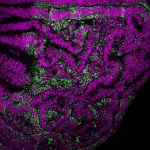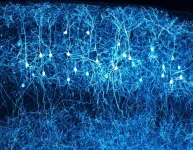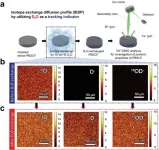Doctors warn against off-label use of new Alzheimer's drug for cerebral amyloid angiopathy
There is no clinical evidence that the monoclonal antibody aducanumab is beneficial to patients with cerebral amyloid angiopathy, according to officers with the International Cerebral Amyloid Angiography Association.
2021-07-06
(Press-News.org) BOSTON - A novel therapy recently approved by the U.S. Food and Drug Administration for patients with Alzheimer's disease amid considerable controversy should not be prescribed by physicians off-label for cerebral amyloid angiopathy (CAA), a similar cerebrovascular condition, according to Steven Greenberg, MD, PhD, director of the Hemorrhagic Stroke Research Program at Massachusetts General Hospital (MGH) and president of the International Cerebral Amyloid Angiopathy Association (ICAAA). In a letter published in The Lancet Neurology, Greenberg and eight other officers of the association wrote that there is no clinical evidence that the monoclonal antibody aducanumab is beneficial to patients with CAA, a condition in which proteins known as amyloid corrode arterial walls in the brain and can lead to bleeding and stroke.
"We believe that there are substantial uncertainties and concerns about both the safety and efficacy of aducanumab in patients diagnosed with CAA [and] therefore believe [it] should not be used for the purpose of treating CAA outside the context of a research trial," the letter stated.
The FDA approved aducanumab on June 7 under the FDA's accelerated approval process for drugs that treat serious conditions and fill an unmet medical need. While the approval was specifically for Alzheimer's disease, it opens the door for physicians to legally prescribe aducanumab off-label for cerebral amyloid angiopathy. Indeed, CAA is thought to be triggered, as in Alzheimer's, by a harmful accumulation of amyloid beta deposits in the brain. Unlike Alzheimer's, however, those deposits typically gather in the cerebral blood vessels, not the brain tissue itself. In giving the green light to aducanumab, the FDA took a position contrary to its own independent advisory committee, as well as many scientists and physicians, who contend there is no convincing evidence to show the drug helps patients.
Leading authorities in the field of cerebral amyloid angiopathy have now taken their own stand, recommending that aducanumab not be prescribed off-label for treatment of CAA. From an efficacy standpoint, the ICAAA officers noted that amyloid beta deposits in blood vessels of the brain appear to be more resistant to antibody-mediated treatment than plaque deposits in the brain tissue, and that insufficient evidence existed to suggest aducanumab was capable of clearing those blood vessels. The physicians cited a previous clinical trial of another anti-amyloid antibody, ponezumab, which found that blood vessel function in patients with CAA trended toward worsening rather than improving following three monthly infusions of the agent.
In terms of safety, the letter from Greenberg and his colleagues cited the fact that amyloid-related imaging abnormalities (ARIAs) had emerged as major adverse events in patients enrolled in trials of aducanumab and other anti-amyloid antibody drugs. ARIAs, which manifest as bleeding or swelling in the brain and are detectable through MRI imaging, are postulated to be triggered by CAA. What the physicians found worrisome was that these abnormalities might occur even more frequently in patients being treated for CAA than the high rates observed in patients treated for Alzheimer's disease.
While discouraging off-label use of aducanumab, Greenberg drew a distinction between patients diagnosed with cerebral amyloid angiopathy and those diagnosed with Alzheimer's disease. "We haven't taken a position on whether an Alzheimer's patient who also has markers of CAA should be prescribed aducanumab," he says. "What we are saying is that the drug shouldn't be prescribed for the purpose of treating CAA."
INFORMATION:
Greenberg is a professor of Neurology at Harvard Medical School and an internationally recognized authority on the diagnosis, causes and treatment of cerebral amyloid angiopathy.
About the Massachusetts General Hospital
Massachusetts General Hospital, founded in 1811, is the original and largest teaching hospital of Harvard Medical School. The Mass General Research Institute conducts the largest hospital-based research program in the nation, with annual research operations of more than $1 billion and comprises more than 9,500 researchers working across more than 30 institutes, centers and departments. In August 2020, Mass General was named #6 in the U.S. News & World Report list of "America's Best Hospitals."
ELSE PRESS RELEASES FROM THIS DATE:
2021-07-06
Chromosomal instability is a feature of solid tumours such as carcinoma. Likewise, cellular senescence is a process that is highly related to cellular ageing and its link to cancer is becoming increasingly clear. Scientists led by ICREA researcher Dr. Marco Milán at IRB Barcelona have revealed the link between chromosomal instability and cellular senescence.
"Chromosomal instability and senescence are two characteristics common to most tumours, and yet it was not known how one related to the other. Our studies indicate that senescence may be one of the intermediate links between chromosomal alterations and cancer," says Dr. Milan, head of the Development and Growth Control laboratory at IRB Barcelona.
"The behaviour we saw in cells with chromosomal instability ...
2021-07-06
(Boston)--During neuropsychological assessments, participants complete tasks designed to study memory and thinking. Based on their performance, the participants receive a score that researchers use to evaluate how well specific domains of their cognition are functioning.
Consider, though, two participants who achieve the same score on one of these paper-and-pencil neuropsychological tests. One took 60 seconds to complete the task and was writing the entire time; the other spent three minutes, and alternated between writing answers and staring off into space. If researchers ...
2021-07-06
BOSTON -- As we age, our brains typically undergo a slow process of atrophy, causing less robust communication between various brain regions, which leads to declining memory and other cognitive functions. But a rare group of older individuals called "superagers" have been shown to learn and recall novel information as well as a 25-year-old. Investigators from Massachusetts General Hospital (MGH) have now identified the brain activity that underlies superagers' superior memory. "This is the first time we have images of the function of superagers' brains as they actively learn and remember new information," says Alexandra Touroutoglou, PhD, director of Imaging ...
2021-07-06
Scientists at the University of Leeds have developed an approach that could help in the design of a new generation of synthetic biomaterials made from proteins.
The biomaterials could eventually have applications in joint repair or wound healing as well as other fields of healthcare and food production.
But one of the fundamental challenges is to control and fine tune the way protein building blocks assemble into complex protein networks that form the basis of biomaterials.
Scientists at Leeds are investigating how changes to the structure and mechanics of individual protein building blocks - changes at the nanoscale - can alter the structure and mechanics of the biomaterial ...
2021-07-06
Two model studies document the probability of climate tipping in Earth subsystems. The findings support the urgency of restricting CO2 emissions as abrupt climate changes might be less predictable and more widespread in the climate system than anticipated. The work is part of the European TiPES project, coordinated by the University of Copenhagen, Denmark but was conducted by Professor Michael Ghil, Ecole Normale Supérieure, Paris, France and coauthours from The Royal Meteorological Institute of Belgium and Parthenope University of Naples, Italy.
Tipping could be imminent
It is often assumed climate change will proceed gradually as we increase the amounts of CO2 in ...
2021-07-06
Streptococcus pneumoniae is a major human pathogen and a leading cause of several infectious diseases including pneumonia, the third-leading cause of death in Portugal. In Europe, S. pneumoniae is the most common cause of community-acquired bacterial pneumonia in adults. Still, very little is known about its colonization within this age group. A team of researchers from ITQB NOVA has now taken a crucial step to clarify the dynamics of carriage of this bacterium in adults.
This bacterium, also known as pneumococcus, can asymptomatically colonize the human upper respiratory tract. Colonization not only precedes diseases but is also essential for transmission. Even ...
2021-07-06
In 2011, scientists confirmed a suspicion: There was a split in the local cosmos. Samples of the solar wind brought back to Earth by the Genesis mission definitively determined oxygen isotopes in the sun differ from those found on Earth, the moon and the other planets and satellites in the solar system.
Early in the solar system's history, material that would later coalesce into planets had been hit with a hefty dose of ultraviolet light, which can explain this difference. Where did it come from? Two theories emerged: Either the ultraviolet light came from our then-young sun, or it came from a large nearby star in the sun's stellar nursery.
Now, researchers from the lab of Ryan Ogliore, assistant professor of physics in Arts ...
2021-07-06
The neocortex is a layered structure of the brain in which neurons are arranged parallel to each other. This organization is critical for healthy brain function. A team of researchers from Charité - Universitätsmedizin Berlin have uncovered two key processes that direct this organization. Reporting in Science Advances*, the researchers identify one crucial factor which ensures the timely movement of neurons into their destined layer and, subsequently, their final parallel orientation within this space.
The neocortex is the outer region of the brain. It is responsible for cognitive functions such as language, decision-making, and ...
2021-07-06
A research team, led by Professor Guntae Kim in the School of Energy and Chemical Engineering at UNIST has introduced an innovative way to quantify proton kinetic properties of triple (H+/O2?/e?) conducting oxides (TCOs) being a significant indicator for characterizing the electrochemical behavior of proton and the mechanism of electrode reactions.
Layered perovskites have recently received much attention as they have been regarded as promising cathode materials for protonic ceramic fuel cells (PCFCs) that use proton conducting oxide (PCO) as an electrolyte. Therefore, quantitative characterization of the proton kinetics in TCO can be an important indicator providing a scientific ...
2021-07-06
Psychologists from UNSW Sydney have developed a new face identification ability test that will help find facial recognition experts for a variety of police and government agencies, including contract tracing.
The Glasgow Face Matching Test 2 [GFMT2] targets high-performing facial recognition individuals known as super-recognisers, who have an extraordinary ability to memorise and recall faces.
The type of professional roles that involve face identification and that could benefit from the test include visa processors, passport issuers, border control officers, ...
LAST 30 PRESS RELEASES:
[Press-News.org] Doctors warn against off-label use of new Alzheimer's drug for cerebral amyloid angiopathy
There is no clinical evidence that the monoclonal antibody aducanumab is beneficial to patients with cerebral amyloid angiopathy, according to officers with the International Cerebral Amyloid Angiography Association.






